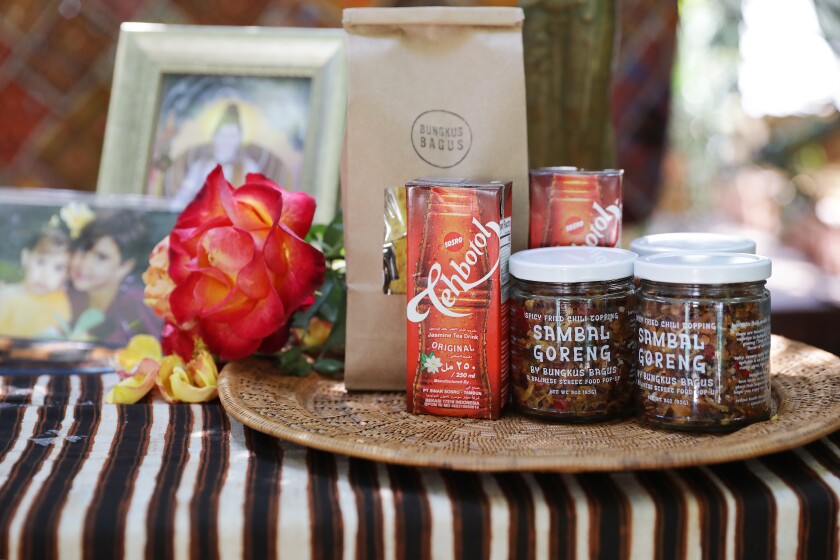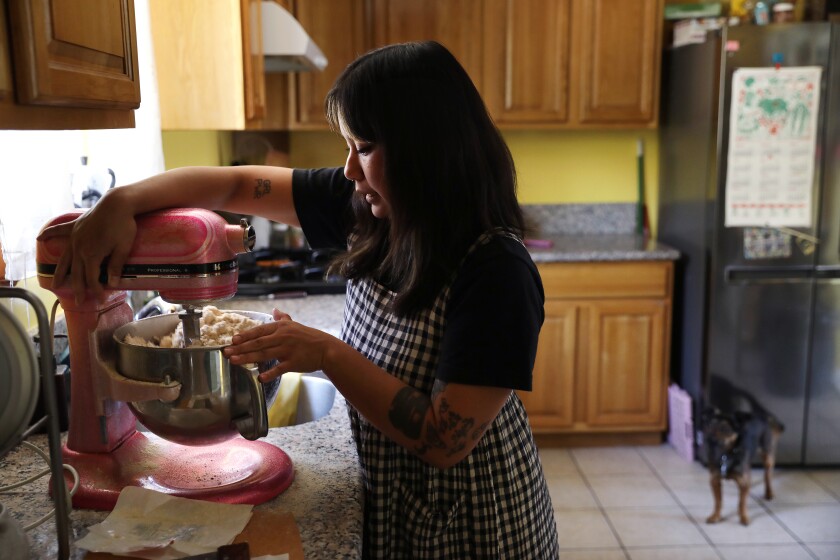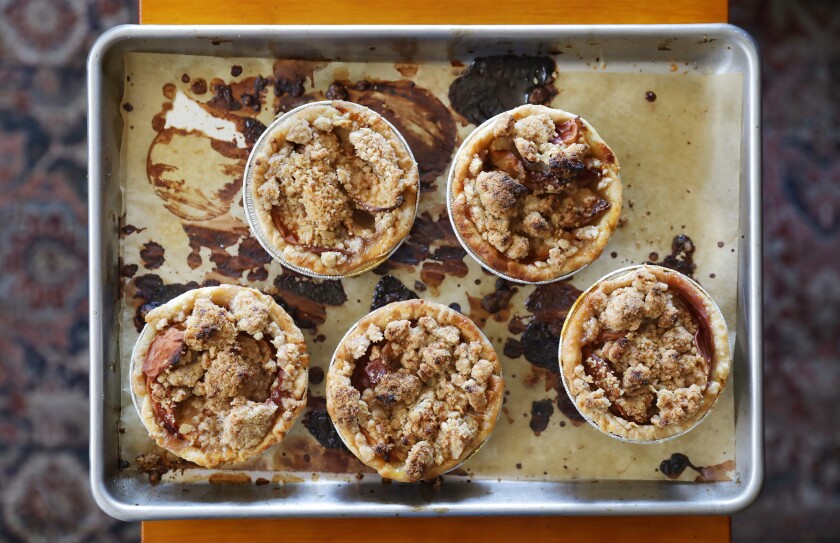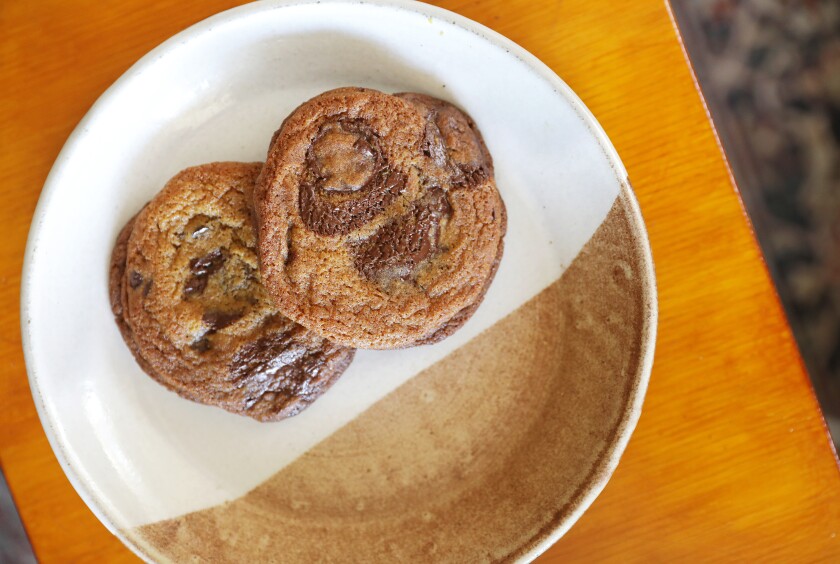On Tuesdays, the sisters behind Bungkus Bagus shop for ingredients. On Wednesdays, they line their Glendale driveway with steel tables and spend hours chopping chiles and garlic for their Balinese-food pop-up, while Thursdays are dedicated to frying aromatics, long beans and sambal goreng. On Fridays, Celene and Tara Carrara trim banana leaves to wrap bungkus, their bundles filled with coconut rice and fragrant curries and hard-boiled eggs, and on Saturdays, they set up a booth reminiscent of their childhood in Indonesia and greet their customers just inside the gate to their home. Sometimes, the line stretches all the way to the sidewalk.
The Carrara sisters never intended to enter the restaurant industry — a year ago, Celene worked as a doula and Tara was a makeup artist. But they, like so many others, had to seek new ways to make money as the pandemic ravaged entire sectors of the economy.
“I don’t think that without COVID, and without the birth of the underground [food] movement, that we’d be doing this,” said Celine Carrara. “It’s bittersweet because so much of the landscape has shifted, and we’ve seen restaurants close that we love, and yet there’s all this new stuff on the horizon, which is also really exciting. It’s kind of surreal.”
For professional chefs, bartenders, servers and others in the hospitality industry, cooking and selling food from home — sometimes with L.A. County permits and licenses, and sometimes without — offered a new means to survive while restaurants and bars were shuttered. They were joined by people like the Carraras who had no restaurant experience, swelling the ranks of L.A.’s home bakers and cooks who have offered social-media-savvy Angelenos special menus, direct access to makers and some of the most exciting dining the area has seen in years.

Items for sale at Bungkus Bagus, a Balinese pop-up in Glendale.
(Christina House / Los Angeles Times)
Often, all it takes from customers is a few taps on Instagram. Once an order is placed, an address is revealed or a delivery is scheduled, and some of L.A.’s best new food is available, in the form of croissants or fried chicken or bentos or cheesecakes or naturally dyed dumplings. Sometimes the options seem endless.
Now, on the brink of a statewide reopening — set for June 15 — L.A.’s pop-up chefs, nomadic restaurants and home cocktail purveyors might need to pivot again as indoor dining and drinking returns to what could very well feel normal. Some of them are ready to resume their day jobs. Others want to stay independent and underground, or they want to grow their businesses more traditionally in a commercial kitchen. A few just want to keep the party going, as long as they can. Current and proposed statewide regulations could also mean change for those operating home kitchens, though they might not help home vendors until 2022.
Currently, California allows only approved “cottage food” operators to prepare foods — including some baked goods, herb blends, dried pasta and preserves — at home. “Class A” operators can sell directly to consumers from their homes and at temporary events such as bake sales, at farmers markets and through agriculture subscriptions. “Class B” operators must be inspected and permitted annually, and can also offer their goods at restaurants, markets and food trucks. Neither class allows gross annual sales to exceed $50,000, and neither allows for items that require refrigeration — disqualifying hundreds of L.A.’s underground pop-ups from legal vending. With AB-377 and AB-1144, this could change.
AB-377 became law in 2019 and allows “microenterprise home kitchen operations” to prepare and sell refrigerated and other non-cottage-food items from a private residence. But it’s up to county governments to opt in and authorize such ventures. Before the pandemic, Los Angeles County officials from several departments were discussing whether to allow them, according to Liza Frias, the director of environmental health services, whose department oversees the cottage-industry program. But the health crisis stalled any decision on the matter.
“At this point, everybody’s really all hands on deck on the pandemic response, and making sure that we’re of course mitigating that,” Frias said. “I’m sure in the future — I don’t know whether that’s six months to a year — that topic will come back up, and we’ll present it for the board [of supervisors] to consider.”
Frias added, “When you’re permitted and you’re registered, you care about what you’re providing; you want to be able to make sure that your customers know that you care. If not, that’s when they contact us and make a complaint.”
Jess Wang is permitted for her bakery, Pique-Nique; her pickle business, Picklé, isn’t eligible for permitting but under AB-377 it could be, if L.A. County opts in. Tired of waiting, Wang is now looking for a commercial kitchen space where she could prepare butter mochi and hand pies as well as pickles — instead of earning money through Zoom-based Picklé pickling classes, which she has taught throughout the pandemic.
AB-1144, which passed the Assembly on May 20 and was sent to the state Senate, would allow Class A cottage-food operators to sell up to $75,000 in gross sales; those with Class B permits could net up to $150,000 in gross annual sales.

Laura Hoang, at home in Monterey Park, sells baked goods under the name Largwa.
(Christina House / Los Angeles Times)
That increase could help independent bakers such as Laura Hoang, a pastry chef who sells under the moniker Largwa and whose operation is growing in popularity and reach.
When downtown L.A. restaurant Buddy’s temporarily closed at the start of the pandemic, Hoang lost an outlet for her pies, cakes and cookies. She also was supposed to begin work at a local coffee shop, which opened days before the shutdown and closed soon after. She found direction, and eventually income, through an operation she ran via Instagram: Heartened by the protests demanding justice for George Floyd, she began selling via direct message, and a portion of the proceeds from her cookies and other treats was donated to mutual-aid groups and nonprofits. Now she sells through retailers such as Chinatown’s Thank You Coffee, still sharing updates through her Instagram account.
Working independently has given her new self-assurance and direction; she’s recently moved to a larger home kitchen, one with ventilation, and one she plans on having certified for a Class B cottage-food permit. She says she sees no need to return to restaurant kitchens, at least not immediately — especially when the industry’s systemic issues of sexual harassment, verbal abuse and underpayment remain rampant.

Laura Hoang’s peach nectarine mini pies.
(Christina House / Los Angeles Times)
“The pandemic has given food makers a safe release from that toxic environment, but it did not spit us into a more stable one,” she said. “It very much was like, ‘Figure it out,’ and I feel lucky to have been able to figure it out.”
Ai Kennedy, who sells sushi made in her home kitchen in Pasadena, also is reluctant to rejoin a restaurant’s staff. The former Sushi Enya and Q chef hosts her weekend bento pickups in an art gallery she manages but she wants to take the next step, whether that is renting a commercial kitchen or opening her own full restaurant someday. She just wishes — for herself and others — that rent were less expensive in Los Angeles.
But even though she’s looking to be part of the system, and though restaurants are reopening and pulling potential orders from L.A.’s pop-ups, she believes the underground is here to stay.
“I think it’s still expanding,” she said. “People learned that there are options like this — they don’t have to go to restaurants — and there are so many interesting chefs doing interesting things.”
Even the inspectors agree.
“I think we’re always going to have an underground industry,” said Frias, of the L.A. County Department of Public Health. “My hope is that we’ll get more people that would want to grow. We’ve seen successes with cottage food, and then they transition into a shared kitchen, and then they end up starting their own business. I mean that, to me, is a success: being able to have your own business.”
Some entrepreneurs are vocal about not wanting to evolve into a more formal restaurant operation.

Laura Hoang’s chocolate chip rye cookies.
(Christina House / Los Angeles Times)
Lazy J’s fries fish every first and third Sunday on the patio behind Sticky Rice in Echo Park. Chefs James Seitz and Jae Hee Lee and operations manager Justin Hodgson needed a reprieve from traditional kitchens — and wanted more of a casual, food-focused party where anyone is welcome and the Budweiser flows freely. At each Lazy J’s pop-up, the music blasts, there are cocktails from Sticky Rice’s bar, Spirit House, and the team fries until they sell out.
“There’s a difference between having fun and making it a hang, and making it a restaurant and seating people,” Hodgson said. “We mostly want to keep it a hang and a slow burn.”
As for the Carraras, they’ve been able to watch the grapevines grow overhead as they’ve fried, tossed, simmered and folded their bungkus for 11 months. There’s a fountain in their backyard that bubbles all day. The serene home setting has inspired them and kept them tied to their childhood.
“I think something that’s really cool about our setup is it uses the home and the business, and that is a very Bali thing,” Tara Carrara said. “In Bali, you don’t have strict delineation between commercial and residential areas, so there are a lot of businesses that are run out of family compounds.”
They’ve been weighing their options for the future of Bungkus Bagus. If they grow their pop-up in a commercial kitchen, they worry it could become too sterile. They’re not sure they want to give up their home, so they’re also considering a private-events path, which would allow them to bring their experience to another backyard — with live cooking, an expanded menu, incense, offerings and music.
“That’s part of the magic of it,” Tara Carrara added. “The whole experience is meeting us, seeing our home, hanging out — the lush plants — and if it was just delivery, you would miss out on a big part of the equation, which is the connection, the community, the personality and the warmth of a real human being.”
appId : '134435029966155',
xfbml : true, version : 'v2.9' }); };
(function(d, s, id){ var js, fjs = d.getElementsByTagName(s)[0]; if (d.getElementById(id)) {return;} js = d.createElement(s); js.id = id; js.src = "https://connect.facebook.net/en_US/sdk.js"; fjs.parentNode.insertBefore(js, fjs); }(document, 'script', 'facebook-jssdk'));
For all the latest Life Style News Click Here
For the latest news and updates, follow us on Google News.
